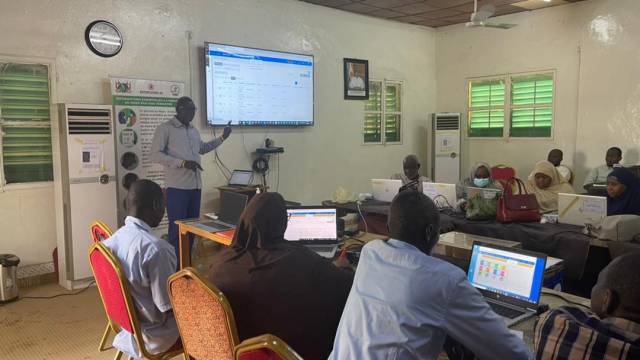You are here
New Case Management System Helps Niger Address Deadly Meningitis Outbreaks
Bacterial meningitis is a highly contagious and debilitating infection that causes inflammation around the brain and spinal cord that can quickly become fatal. The West African nation of Niger has a long history of persistent and recurring outbreaks of bacterial meningitis, including a devastating 2015 epidemic of Neisseria meningitidis C, that resulted in nearly 9,000 cases and more than 800 deaths.
The Niger Ministry of Health has made combatting this ongoing health threat a national priority. Rapid detection is essential to controlling meningitis outbreaks, yet outdated and decentralized data management systems, specimen transport delays and limited laboratory capacity often slow the public health response.
To address these challenges, the Niger Ministry of Health collaborated with MenAfriNet, an international consortium of public health organizations working to establish a regional meningitis surveillance network in Sub-Saharan Africa. MenAfriNet was established in 2013 with an initial grant from the Bill & Melinda Gates Foundation, and partners include the U.S. Centers for Disease Control and Prevention (CDC), the World Health Organization-Regional Office for Africa (WHO-AFRO), Davycas International and the CDC Foundation.
“The main problems today for meningitis management are the amount of time it takes for investigations to take place and the delays in implementing reactive vaccination campaigns,” said Aboubacar Adakal, coordinator for Davycas Niger.
The Niger Ministry of Health, with the support of MenAfriNet partners, implemented a new case-based data management system known as the System for Tracking Epidemiological Data and Laboratory Specimens (STELab).
The STELab platform, which was successfully established in neighboring Burkina Faso in 2017, modernizes the response process by using barcodes for rapid nationwide meningitis reporting and tracking fluid specimens as they are transported across the country. The system gives health staff access to real-time case data to help detect epidemic outbreaks and identify the specific pathogen involved. This allows for a faster and more targeted response.
The deployment of STELab in Niger began on April 15, 2022. Adakal notes that by the third day of health staff training, participants were enthusiastic and committed to learning the program, making it clear that transitioning to STELab was the right move.
The coordination and hard work that went into the STELab rollout in Niger is an example of the ongoing commitment of MenAfriNet and their country partners to improve meningitis surveillance and respond to the needs of regional health workers.
“MenAfriNet is making meaningful efforts to make resources easily available and enable regional and central levels to rapidly respond to suspected outbreaks,” Adakal said. “Colleagues on both the laboratory and epidemiology side are dedicated to working together synergistically to produce more complete, higher-quality and timely data and make it available faster.”
Plans for more annual trainings are already underway as Niger looks to improve and expand STELab as a crucial tool in the fight against meningitis.
“These efforts must be maintained for the well-being of our populations,” Adakal said.

